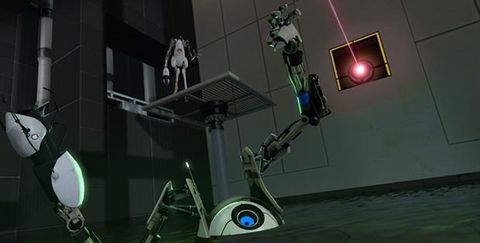GamesRadar+ Verdict
Pros
- +
More brilliant puzzles
- +
Impeccable dialog
- +
acting
- +
and story
- +
A cooperative mode that's actually cooperative
Cons
- -
It can't have the impact of Portal
- -
It's big
- -
but not long
- -
'Still Alive' is tough to follow
Why you can trust GamesRadar+
Portal 2 isn't everything I wanted it to be, but how could it have been? In 2007, Portal jumped out from behind the release of Half-Life 2: Episode 2, catching us unawares and stupefying our faces off, and we've spent the past four years canonizing it with jokes about Companion Cubes, cake lies, and huge successes. Without the element of surprise, and with an impossible tower of expectations looming over it, the best developer Valve could have hoped to do is make Portal 2 the next best thing. It succeeded.
Portal 2 returns the series' protagonist, Chell, to the testing grounds of the massive Aperture Science laboratory for another round of discombobulating puzzle solving, and another chance to escape. If you've somehow never played Portal, Portal 2 will ease you into its puzzles with a gentle learning curve. Go in one portal, go out the other - the primary mechanic seems simple enough, but as the complexity of the 'test chambers' increases, the solutions become increasingly unexpected. One of the primary joys of playing Portal 2 is surprising yourself with your own solutions - despite knowing that each test was designed guide me to toward one solution, I still felt like a genius when my seemingly hackneyed plans actually worked.
If you have played Portal, the first few chapters of Portal 2 will feel like repeating Kindergarten (put the cube on the button - got it), but once the game's new mechanics, such as the Discouragement Redirection Cubes, Aerial Faith Plates, and Repulsion Gel, are introduced, your brain will get its due stimulation.
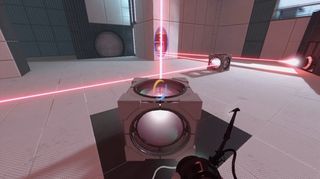
Above: Portal's energy balls have been replaced with lasers (this is a very good thing)
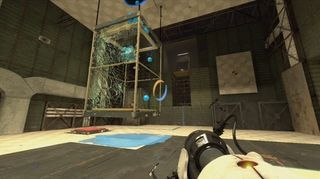
Above: The gels can be cumbersome at first, but once you get used to their properties, they add a significant twist to the puzzles
Mindlessly solving the tutorial puzzles isn't so bad, anyway, because you'll be preoccupied with reveling at the grand set pieces and anticipating every new bit of sublimely witty dialog (GLaDOS is really, really mad)and enthralling plot progression. Unlike Portal, which only briefly pulls back the test chamber walls to reveal the facility's inner workings, Portal 2 is scattered with extended excursions into Aperture's monolithic, mechanical underground empire.
Above: One of GLaDOS' many taunts
Portal 2 fleshes out the rise and fall of Aperture Science, its maniacal AI overlord, GLaDOS, and its apparent last human test subject, Chell. To that end, it introduces the surprisingly expressive (for a cyclops) Wheatley, a bumbling spherical 'Personality Core,' voiced by Stephen Merchant, and Cave Johnson, Aperture's bombastic founder, whose voice, handled perfectly by J.K. Simmons, bellows from loud speakers in a condemned section of the original facility.
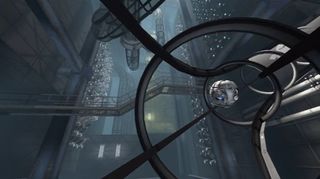
Above: Aperture is really, really big
To sustain a longer experience than Portal, and to offer eager fans the sustenance they craved, Portal 2 had to introduce new characters and tell a bigger, more explicit story, but that inevitably killed some of its charm. At the beginning of Portal, all we explicitly knew was that we were a test subject, and that we had to complete tests to progress. We assumed we'd have to confront GLaDOS eventually, but were given no solid explanation of our situation or purpose aside from what we could gather from GLaDOS' snide remarks and the mysterious scribbles hidden behind wall panels. Portal's understated story is part of what made it so intriguing, but while Portal 2 doesn't swing entirely toward direct exposition, it casts off much of that subtlty.
But what was it supposed to do? Portal 2 couldn't surprise us in the ways we wanted to be surprised and still be surprising, so it surprises us with, well, surprises that I won't spoil for you. Surprises are actually a major reoccurring theme in the game, which feels a bit like an indirect acknowledgment of our desire to be surprised by it. OK, it looks like my critical logic is now looping through portals as well, so I'll move on to my next point, which is that regardless of what anyone wanted from Portal 2, it does everything so damn well that our expectations seem moot.
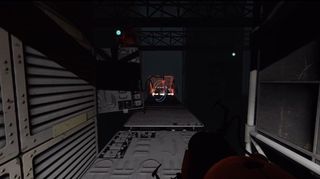
Above: Chell's journey is far more varied than it was in Portal
Portal 2 is more emotional than Portal, without losing the tongue-in-cheek irreverence. At times, I was enjoying the gravity and humanity of the game so much that the silliness bothered me, but it's well-balanced overall. It's puzzles are some of the most refined and inventive challenges I've ever encountered, and every moment of every segment of every chapter felt like a piece of a puzzle that I wasn't aware was being put together until after the picture was in front of me.
Everything in Portal 2 is designed, crafted, and paced to eschew fatigue and keep you thinking, wondering, and smiling. The scripted events are so sharply written, well-timed, and fluidly mixed with the gameplay that by the end of the game, I felt like I was having a conversation with it rather than playing it. Valve is starting to seem more like a techno-psychology laboratory than a game developer (perhaps it outsources product testing to GLaDOS?).

Above: In a couple sections, part of the challenge is knowing where the hell you're going
I'm not saying that the single player experience is perfect. I got stuck a few times, especially during Cave Johnson's segments, not because I had failed to make a logical connection, but because I'd simply failed to see a distant platform, and spent ten minutes looking for a more complex solution. Some players will surely experience the same thing, while others will play through the game without ever being misdirected. It's a minor complaint, and may only be the result of the scale of Valve's ambition for Portal 2.
That ambition also includes a separate co-op mode, which is equally great, just in different ways.
More info
| Genre | Puzzle |
| Description | This time around, GLaDOS' reign of physics-bending tyranny is a whole new cube game. In fact it's going to make Portal look like a trailer for the main event. |
| Franchise name | Portal |
| Platform | "PS3","PC","Xbox 360" |
| US censor rating | "","","Teen" |
| UK censor rating | "","","" |
| Release date | 1 January 1970 (US), 1 January 1970 (UK) |
